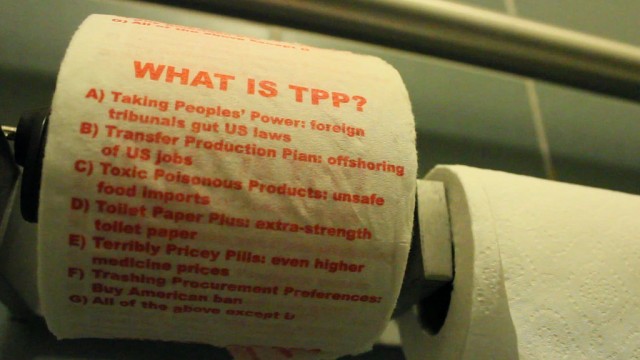Leaked US proposal on copyright’s limits : TPP draft looks more restrictive than some had hoped.

Ars Technica | Aug 5 2012
Leaked US proposal on copyright’s limits : TPP draft looks more restrictive than some had hoped.
by Megan Geuss
Late Friday, a few short paragraphs of text were leaked that revealed something of the terms on fair use being negotiated in secret by the Trans-Pacific Partnership. The TPP is a treaty currently being negotiated by nine Pacific Rim countries seeking to establish a new free-trade agreement on many issues, including intellectual property. The next negotiating round is set for early September in Leesburg, Virginia.
Much has been made of the secrecy in which the TPP has enshrouded its negotiations for an international trade agreement. In May, 30 scholars wrote to the US Trade Representative (USTR) asking for more transparency in the decision-making process, and critics have routinely claimed that such processes cater largely to narrow rightsholder interests.
The TPP met last in early July in San Diego, CA for a round of negotiations, but none of the draft texts were made public. After that round of negotiations concluded, the USTR sent an e-mail to the press announcing that it was proposing language on fair use and limitations to copyright in the international treaty, a first for the generally conservative agency. But the leaked text, revealed by Knowledge Ecology International, suggests that these exceptions to IP rules won’t be quite as open as some fair use advocates had hoped.
Back in July, a USTR spokesperson said the trade agency would push for rules "that will obligate Parties to seek to achieve an appropriate balance in their copyright systems in providing copyright exceptions and limitations for purposes such as criticism, comment, news reporting, teaching, scholarship, and research." But in the new leaked draft text, while very similar phrasing appears, there seems to be room to crack down on any anticipated broad terms of fair use.
The US and Australia, for instance, proposed what entities like the EFF and KEI fear could be a rightsholder-friendly three-step test to determine what exceptions to copyright are allowable. The leaked texts specifically say that the participating countries should confine these limitations "to certain special cases that do not conflict with a normal exploitation of the work, performance, or phonogram, and do not unreasonably prejudice the legitimate interests of the right holder."
It’s important to note that the draft is just that—a draft. But the leak suggests that the US and Australia are pushing for more restrictive language, while countries like New Zealand, Chile, Malaysia, Brunei, and Vietnam are in favor of more open rules to allow "a party to carry forward and appropriately extend into the digital environment limitations and exceptions in its domestic laws." The US and Australia opposed that wording, and sought to change the language to suggest, “that each party may, consistent with the foregoing, adopt or maintain... exceptions and limitations for the digital environment."
In other words, the US and Australia are saying a country can’t just decide on "limitations and fair use" based on existing domestic IP laws, some of which may be quite broad. Instead, limitations must conform to international agreements, including the TPP, which can be more restrictive.





